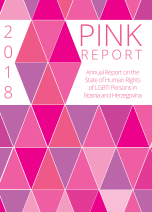2018 Pink Report - Annual Report on the State of Human Rights of LGBTI Persons in Bosnia and Herzegovina
2018 Pink Report - Annual Report on the State of Human Rights of LGBTI Persons in Bosnia and Herzegovina
Author(s): Vladana Vasić, Emina Bošnjak, Darko Pandurević, Liam Isić, Jozo Blažević, Lejla HuremovićSubject(s): Gender Studies, Education, Law, Constitution, Jurisprudence, Media studies, Criminal Law, Human Rights and Humanitarian Law, Evaluation research, Social differentiation, Social Norms / Social Control
Published by: Sarajevo Open Centre
Keywords: BiH; human rights; LGBTI; 2018; gender; annual report; education; judiciary; law; equality; discrimination; criminal acts; asylum; media;
Summary/Abstract: The legislative framework for protecting the human rights of LGBTI persons and ensuring their equality has improved somewhat in the past three years. However, our research on the needs and problems of the LGBTI community in BiH conducted in 2017 has shown that hate speech, discrimination and violence against the LGBTI community are still a widespread occurrence. LGBTI persons are often unable to lead a normal life or meet basic human, social or cultural needs (e.g. be open about their romantic relationships, express their gender, etc.). The fear of violence, discrimination and/or exclusion frequently results in extreme self-isolation and reluctance to engage in certain cultural or social activities, express one’s views, etc. The results of monitoring discrimination and violence throughout 2017 show that transgender persons are particularly vulnerable. Even media reporting, which is usually neutral, took a sensationalist tone and focused exclusively on the sex-reassignment process, instead of the transphobic environment and its effects on the life of transgender persons in Bosnia and Herzegovina. The negative trend of growing domestic violence and peer violence on the grounds of SOGISC continued in 2017. There is still no concrete, institutional plan to combat peer violence and develop an inclusive, tolerant learning environment that incorporates the LGBTI perspective. Restricting freedom of assembly of LGBTI persons through administrative obstacles on the local and cantonal level is the most alarming trend. If it continues, this trend could seriously jeopardise and limit the work of LGBTI activists and civil society organisations that work on protecting the rights of LGBTI persons. Unfortunately, the growing violence, discrimination and restriction of the rights and freedoms of LGBTI persons elicited only sporadic responses from most institutions in charge of protecting and promoting human rights, including the rights of LGBTI persons. This creates a climate in which alleged security issues, assessed by various social actors who should not and cannot make decisions impacting people’s rights and freedoms, take precedence over protecting the rights and freedoms of LGBTI persons and ensuring equal treatment. The lack of a systematic, quick and adequate response from the authorities may further undermine the faith of LGBTI persons in the institutions, especially those most responsible for protecting human rights: the police and judiciary, as well as local institutions in charge of providing services to LGBTI citizens.
Journal: ROZI IZVJEŠTAJ
- Issue Year: 2018
- Issue No: *
- Page Range: 1-56
- Page Count: 56
- Language: English

